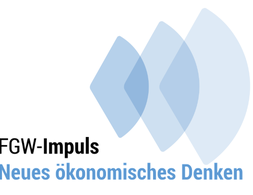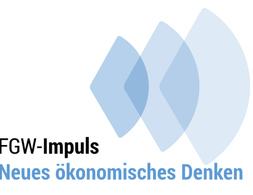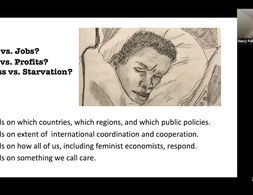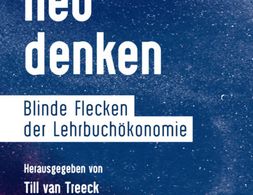151 Ergebnisse
This book provides a comprehensive description of this intriguing new area of feminist economics. It includes discussion of what constitutes feminist economics and how feminist economics is different from other approaches
In Colonial Debts Rocío Zambrana develops the concept of neoliberal coloniality in light of Puerto Rico's debt crisis. Drawing on decolonial thought and praxis, Zambrana shows how debt functions as an apparatus of predation that transforms how neoliberalism operates.
In this essay, the principle of capital accumulation, as well as the idea of homo economicus as the basis of the growth model, are located and analyzed from a feminist perspective. The sufficiency approach is presented as an alternative to these two economic logics.
Dependency in Central and Eastern Europe - Self-reliance and the need to move beyond economic growth
In this essay, the author takes a critical perspective on the pursuit of growth as the solution for providing for environmental sustainability and economic stability in the countries of Central and Eastern Europe.
Drawing from the framework of dependency theory and presenting brief insights into European core-periphery relations the author then argues for the implementation of an alternative strategy to development that is built around the concept of self-reliance.
In this essay the author reviews empirical studies in economics that analyze factors behind the rise of nationalist and populist parties in Western countries. He stresses that economic factors (e.g., trade shocks and economic crisis) play a crucial role in the rise of populist parties; however, the discussion of mechanisms driving this trend remains unsatisfying
In this essay the authors take a look at how welfare could be provided in a degrowth society.
Ist das BIP wirklich der Wert, an welchem wir den Fortschritt eines Landes und einer Gesellschaft messen sollten? Wir sollten über den Punkt hinaus kommen, an welchem wirtschaftlicher Erfolg mit Wirtschaftswachstum und gesellschaftlichem Fortschritt gleichgesetzt wird. Stattdessen könnte die Art, wie wir wirtschaften, als Mittel zum Zweck für eine Gesellschaft dienen, die ihren Wohlstand neu definiert und nicht mehr von quantitativem Wachstum abhängig macht.
Auch wenn viele Ökonom_innen den Kritikpunkten zustimmen, wie die 2016 von dem Netzwerk Plurale Ökonomik und der Universität Kassel erstellte Studie EconPLUS aufzeigt, ändert sich die Lehre nur sehr langsam. Deswegen entstand im Netzwerk Plurale Ökonomik die Idee, selbst eine Online-Lehr- und Lernplattform zu pluraler Ökonomik zu erstellen. Diese Plattform Exploring Economics ging im Dezember 2016 online.
Ökonomische Ungleichheiten und große Unterschiede in den Lebensbedingungen sind für die Europäische Union (EU) eine wachsende politische Herausforderung. Die Unterschiede in den Einkommen führen zu verstärkter Arbeitsmigration sowie zu Lohn- und Sozialdumping – und sie treiben den Standortwettbewerb zwischen den Mitgliedstaaten an. Hierbei geht es oft um ökonomische Indikatoren, das heißt um Messgrößen, die über die jeweilige wirtschaftliche Situation oder Struktur der Länder Auskunft geben; Fragen der Lebensqualität und des gesellschaftlichen Wohlergehens erhalten unter diesem Blickwinkel innerhalb der EU hingegen kaum Aufmerksamkeit.
This is an overview of (possibly transformative) proposals to address the economic consequences of the corona crisis
In the history of the social sciences, few individuals have exerted as much influence as has Jeremy Bentham. His attempt to become “the Newton of morals” has left a marked impression upon the methodology and form of analysis that social sciences like economics and political science have chosen as modus operandi.
If there’s one method economists have neglected the most, it’s qualitative research. Whereas economists favour mathematical models and statistics, qualitative research seeks to understand the world through intensive investigation of particular circumstances, which usually entails interviewing people directly about their experiences. While this may sound simple to quantitative types the style, purpose, context, and interpretation of an interview can vary widely. Because of this variety, I have written a longer post than usual on this topic rather than doing it a disservice. Having said that, examples of qualitative research in economics are sadly scant enough that it doesn’t warrant multiple posts. In this post I will introduce qualitative research in general with nods to several applications including the study of firm behaviour, race, Austrian economics, and health economics. More than usual I will utilise block quotes, which I feel is in the spirit of the topic.
In der Lehrveranstaltung „Plurale Feministischen Ökonomie“ erhalten die Studierenden einen Einblick in die unterschiedlichen Debatten innerhalb der Feministischen Ökonomie, die von der Subsistenztheorie bis hin zur Queer Economics reichen, und lernen die wissenschaftstheoretischen, normativen und methodischen Hintergründe kennen.
The objective of the course is to explore the main strengths and weaknesses of orthodox and heterodox paradigms within development economics.
Introduction Economics is by necessity a multi paradigmatic science Several theoretical structures exist side by side and each theory can never be more than a partial theory Rothschild 1999 Likening scientific work to the self coordinating invisible hand of the market Michael Polanyi cautioned strongly against centralized attempts to steer …
Um Transformationsprozesse nicht nur zukunftsfähig, sondern auch geschlechtergerecht gestalten zu können, müssen die Erkenntnisse der Feministischen Ökonomie einbezogen werden. Ein Beitrag von Ulrike Knobloch.
Marxian Political Economy focuses on the exploitation of labour by capital. The economy is not conceived as consisting of neutral transactions for exchange and cooperation, but instead as having developed historically out of asymmetric distributions of power, ideology and social conflicts.
Post-Keynesians focus on the analysis of capitalist economies, perceived as highly productive, but unstable and conflictive systems. Economic activity is determined by effective demand, which is typically insufficient to generate full employment and full utilisation of capacity.
Der Fokus der Marxistischen Politischen Ökonomik liegt auf der Ausbeutung von Arbeit durch Kapital. Die Ökonomie wird nicht als neutrale Austausch- und Kooperationsplattform gesehen, sondern als historische und politische Ausprägung, die von asymmetrischen Machtverhältnissen, Ideologie und sozialen Konflikten geprägt ist.
Der Fokus des Postkeynesianismus liegt auf der Analyse kapitalistischer Ökonomien. Diese werden als sehr produktive, jedoch instabile und konfliktive Systeme angesehen. Wirtschaftliche Aktivität wird von der effektiven Nachfrage bestimmt, die in der Regel keine Vollbeschäftigung und Vollauslastung der Kapazitäten garantieren kann.
Has neoliberalism destroyed gender equality Advocate author and broadcaster Beatrix Campbell examines the emergence of a new model of patriarchy and proposes solutions Beatrix Campbell iai
When you notice inequality in your everyday life do you ever wonder where it comes from and what keeps it going This sociology course introduces you to core concepts of class gender and racial inequality and an approach to studying complex forms of inequality called intersectionality Featuring interviews with top …
This is an online panel and discussion on the ongoing and potential gendered impacts of COVID-19 organized by the International Association of Feminist Economics (IAFFE).
Das Studium der Volkswirtschaftslehre bietet einen Einblick in den Maschinenraum derjenigen Wissenschaft, welche eigentlich die Funktionsweise unserer Wirtschaft untersuchen sollte. Leider bleibt es jedoch dabei: Die Student*in lernt wenig darüber, wie das Wirtschaften als komplexes Zusammenspiel verschiedener Beteiligter tatsächlich funktioniert oder funktionieren könnte. Ein Beitrag von Jörn Schirok.
Ihre Erklärungs- und Deutungslogik hat die Ökonomik in der zweiten Hälfte des 20. Jahrhunderts selbstbewusst auf nahezu alle gesellschaftlichen Phänomene ausgedehnt. Auch auf Diskriminierung und Rassismus. Leider dreht sich auch bei diesem Thema die Mainstream-Ökonomik um sich selbst, argumentieren Steffen Haag und Elena Goschin.
„Wirtschaft neu denken“ umfasst 20 Rezensionen aktuell einflussreicher Lehrbücher und zeigt: Viele Standardwerke blenden wissenschaftliche und gesellschaftliche Kontroversen systematisch aus und stellen wirtschaftliche Zusammenhänge, die seit jeher in hohem Maße komplex und umstritten sind, als scheinbar objektive Gesetzmäßigkeiten dar.
Das Modell des homo oeconomicus erklärt in der Mainstream-Ökonomik das Verhalten des Individuums nach der Logik der Situation. Auch wenn Vertreter*innen des Konzepts betonen, dass es sich um eine wissenschaftliche Abstraktion handelt, fungiert der homo oeconomicus auf der gesellschaftlichen Makroebene jedoch als repräsentativer Akteur und stellt somit eine Reduktion des Menschen dar. Ein Essay von Elena Goschin.
Along with addressing core conceptual issues in defining heterodox economics, we will cover in some detail five heterodox traditions in economics: Marxian Economics, Institutional Economics, Post-Keynesian Economics, Feminist Economics, and Ecologi-cal Economics. In the first class meeting, we discuss the structure and goals of the course, as well as the expectations and requirements from the students. In addition, we will discuss the concept of heterodoxy in economics, along with discussing the concepts and key issues in mainstream and neoclassical economics.
Could working less make people and the planet better off? Find out in this dossier by exploring the landscape of working time reduction policies and their potential for reimagining, restructuring, and redistributing time as a political resource in the 21st century economy.
This video explains what the term 'Feminist Economics' describes and goes into detail on how feminist economists use methodology differently, why they advocate for diversity in research and how to look into preconditions for the functioning of our economies. It, additionally, highlights the link between feminist economics and the study of climate change.
This course has dual purposes, to introduce students to the various stages of research and to provide an introduction to feminist perspectives on the politics of producing knowledge. Each student will learn how to be an interdisciplinary researcher while coming to understand the opportunities that feminism presents as a way of seeing, knowing, and representing the world.
The workshop introduces into the field of critical political economy and tries to identify the role of finacial markets in capitalism, the reason for financial crises and the relevance of Marx in regard to these topics.
Wir nutzen Cookies. Klicke auf "Akzeptieren" um uns dabei zu helfen, Exploring Economics immer besser zu machen!



























